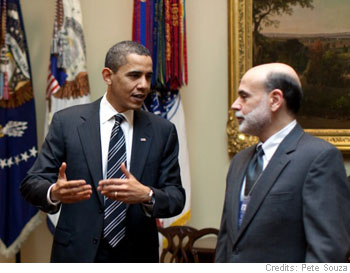 The Fed has finally came clean. It now admits it bailed out Bear Stearns – taking on tens of billions of dollars of the bank’s bad loans – in order to smooth Bear Stearns’ takeover by JPMorgan Chase (JPM). The secret Fed bailout came months before Congress authorized the government to spend up to $700 billion of taxpayer dollars bailing out the banks, even months before Lehman Brothers collapsed. The Fed also took on billions of dollars worth of AIG securities, also before the official government-sanctioned bailout.
The Fed has finally came clean. It now admits it bailed out Bear Stearns – taking on tens of billions of dollars of the bank’s bad loans – in order to smooth Bear Stearns’ takeover by JPMorgan Chase (JPM). The secret Fed bailout came months before Congress authorized the government to spend up to $700 billion of taxpayer dollars bailing out the banks, even months before Lehman Brothers collapsed. The Fed also took on billions of dollars worth of AIG securities, also before the official government-sanctioned bailout.
The losses from those deals still total tens of billions, and taxpayers are ultimately on the hook. But the public never knew. There was no congressional oversight. It was all done behind closed doors. And the New York Fed – then run by Tim Geithner – was very much in the center of the action.
This raises three issues.
First, only Congress is supposed to risk taxpayer dollars. The Fed is not part of the legislative branch. Its secret deals, announced almost two years after they were done, violate the democratic process, if not the Constitution itself. Thomas Jefferson put a stop to Alexander Hamilton’s idea of a powerful central bank out of fear it would be unaccountable to the public. The Fed has just proven Jefferson’s point.
Second, if the Fed can secretly bail out big banks, the problem of “moral hazard” – bankers taking irresponsible risks because they know they’ll be rescued – is far greater than anyone assumed after Congress and the Bush and Obama administrations bailed out the banks. Big banks will always be too big to fail because they know the Fed will secretly back them up if they get into trouble, even if Congress won’t do it openly.
Third, the announcement throws a monkey wrench into the financial reform bill now on Capitol Hill, which gives the Fed additional authority by, for example, creating a consumer protection bureau inside it. Only yesterday, Sen. Jim DeMint (R-S.C.) blasted the Dodd bill for expanding the Fed’s authority “even as it remains shrouded in secrecy.”
The Fed has a big problem. It acts in secret. That makes it an odd duck in a democracy. As long as it’s merely setting interest rates, its secrecy and political independence can be justified. But once it departs from that role and begins putting billions of dollars of taxpayer money at risk — choosing winners and losers in the capitalist system — its legitimacy is questionable.
That it chose to reveal the truth about its activities during a week when Congress is out of town, when much of official Washington and the Washington media have gone on vacation, and only after several federal courts have held that the Fed must release documents related to its bailout of Bear Stearns, suggests it would rather remain secret than become transparent.
Much of what Ben Bernanke and Tim Geithner did (when Geithner was at the New York Fed) in 2008 was presumably necessary. But the public has no way of knowing. The public doesn’t even know who else the Fed has bailed out, or what entities it will bail out in the future. All we know is the Fed secretly bailed out Bear Stearns and AIG and thereby subjected taxpayers to risks that remain even today, without informing the public. That’s not a record on which to build public trust.
Disclaimer: This page contains affiliate links. If you choose to make a purchase after clicking a link, we may receive a commission at no additional cost to you. Thank you for your support!



Leave a Reply